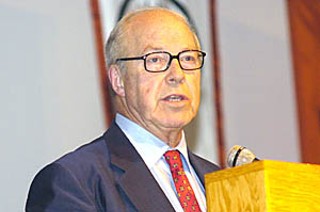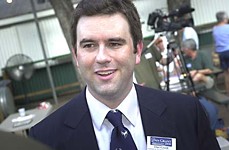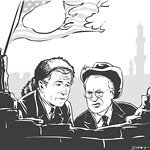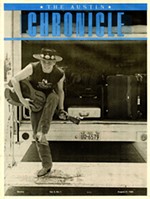Blix In Austin:
Why the war wasn't necessary
By Lee Nichols, Fri., May 7, 2004

A near full-house, including Lady Bird Johnson in the front row, packed the 700-seat auditorium at the University of Texas' LBJ Library on April 28 to hear Sweden's Hans Blix, formerly the United Nations' chief weapons inspector in Iraq. Blix's mild personality and genial good humor belied the current of bitterness running through his words. Pulling few punches, he asserted that the war in Iraq and its human toll could have been averted through continued inspections, which would have revealed that Iraq possessed no weapons of mass destruction. Instead, he says, the Bush administration – which he all but called liars – pushed the war for political reasons, until it became a "train [that] had its own momentum." The lecture amplified points he makes in his new book, Disarming Iraq. – Lee Nichols
Excerpts from Blix's 45-minute speech:
History will draw more and safer conclusions than we can do now. But already now, we can and we should try to learn some lessons.
An elementary but important lesson is that it does matter in which way conflicts between and within societies are sold – by war, civil strife, terrorism; or through accommodation, negotiation, or diplomacy. During the Cold War, one solution to the East/West controversy was named "mutually assured destruction," or MAD. A sad, and costly, solution to that conflict, and fortunately, it was not used.
Other options are containment, negotiation, accommodation, which are less costly. It has been said, indeed, that it is better that old negotiators get answers at the conference tables than that young men get killed on the battlefields. The cost in life and health and the cost in dollars are different if you choose the conference table or if you choose war.
In 2002 and 2003, the U.S. and the United Nations, and the world, wanted credible assurance that Iraq had no nuclear, chemical, or biological weapons and no missiles with a longer range than 150 kilometers [93 miles]. Was this assurance to be sold through armed force and occupation, or through pressure and inspections? These were the two main options.
At the U.N., we calculated – I remember talking to Kofi Annan about this in February of last year – we calculated that trying to achieve this assurance through inspection and long-term monitoring would require some 200 inspectors and cost something like $80 million per year. It had been done for eight years, between 1991 and 1998.
The other option to ensure that no weapons of mass destruction remained – the option through war and occupation – was calculated to cost around $80 billion for a year, and require some 200,000 men. We have now learned through the war option, which was chosen by the UK and U.S., that there were no weapons of mass destruction and we have learned that the costs are turning out to be much higher than calculated, both in lives in money.
And many ask whether these costs in lives and money were necessary. Was it a war of necessity? In my view, no.
I'm not a pacifist. Nor is the U.N. charter based on pacifism. The charter allows the Security Council to determine that there is a threat to the peace, or a breach of the peace, or an act of aggression, and to authorize armed action. It also allows member states to take armed action in self-defense if an armed act has occurred, and then, even without the authorization of the council.
Were we seeing a case of self-defense in March 2003? Had Iraq attacked the U.S. or UK? Certainly not. Was Iraq a threat to the peace, to the UK peace or the U.S. peace? Certainly not. Saddam's army was in a miserable shape. There was no longer any nuclear infrastructure to make bomb-grade material, as there was in 1990. It was suspected that he might still have some biological and chemical weapons and medium-range missiles. Though no weapons, actual weapons, had been found by inspectors for about 10 years. They had found lots of facilities and precursors of equipment, but no stocks of weapons.
In 2003, if we are to believe Bob Woodward in his book, the U.S. administration had become 100% convinced – 100% erroneously convinced – about the existence of weapons of mass destruction in Iraq. The U.S. government began to lose patience with inspectors when the inspectors did not report finding any smoking guns during the first month of work. ... Woodward implies that I was bugged, and reports that some in the U.S. cabinet who [were] absolutely convinced of the existence of weapons concluded that I must be a liar. Well, in retrospect, I do feel some resentment about such suspicions, and I feel resentment if indeed I was bugged, because the idea of (working) together with members of the Security Council and then learning that their representatives might perhaps be sitting and poring over reports of what I had said is not a pleasant one. At the same time, if they did bug me, I must say that at least I wish they had listened more carefully to what I had said. [audience laughter and applause]
Others in the U.S. administration undoubtedly had a low opinion about inspections, even long before the war started. Mr. Cheney said in August 2002 that inspections were useless at best. And when I met him in October 2002 ... he said that the U.S. would not hesitate to discredit the inspectors in favor of disarmament.
What would have happened if the U.S. and the U.K. would have heeded the view of the majority of the states in the 15-member Security Council in March of 2003? I think – but it's speculation, I admit – it's likely that in April and in May of 2003 the evidence that was invoked by the U.S. and the UK would have fallen further apart.
Why? By mid-March 2003, the inspectors had made some 700 inspections and had been to dozens of sites which were recommended by intelligence agencies, including those of the UK and the U.S., and they had found no weapons of mass destruction. We had been to dozens of sites recommended by intelligence as likely to contain illegal items, and we had found none.
This, I think, said something to me, and should have said something to those who gave us the intelligence, about the quality of the tips which we had received and they had received. We were told that they were the best, and though appreciative of what we were given, we asked ourselves then, "What was the rest?"
Some of the tips undoubtedly came from defectors who wanted invasion, not inspection. If the inspection would have continued a few months more, all the sites suspected by intelligence would have been inspected and no weapons of mass destruction would have been found.
Was the war predetermined? Now several in the Bush administration certainly wished to bring change in Iraq, even before 9/11, 2001, and were only more determined after that date. There was a desperate wish, as you remember, to link Iraq with 9/11, to find Iraqi links to al Qaeda, and some have suggested that the short period of inspections that we had was only a sham, filling in time while the military buildup took place for the invasion.
However, what some in the Bush administration might have wanted cannot, in my view, be directly attached as an ambition of the president. I would be more inclined to think that as of the summer of 2002, the situation was a bit like putting a train on the rail, loading more and more military people and equipment on it while it is moving forward in time. ...
Maybe it was hoped by some in the administration that under the increasing pressure the Iraqis would crack and disclose the weapons they were suspected of having. Well, they could not, as they had none.
The train had its own momentum, and although the engineer – the president– could have slowed it, or stopped it, or turned it into a side line, it would have, I think, politically have required a rather spectacular event to explain such an action to the public – more than just increasing doubts about the evidence on weapons of mass destruction. We find on the contrary, then, that as the evidence weakened, the train moved on, and the U.S. thereby painted itself into a corner.
I am often asked even now if we can be certain that there were no weapons of mass destruction in March 2003. And if not, when were they destroyed? Could they have been sent to Syria after or before the occupation?
I believe the main hypothesis, which still needs to be verified, must be that most of the [biological and chemical] weapons were destroyed already in 1991, as was indeed stated by Hussein Kamel, the son-in-law of Saddam Hussein, who defected to Jordan and later was murdered when he returned to Iraq.
That [biological and chemical] agents were destroyed in 1991has been confirmed both by UNSCOM, the earlier inspectors, and by inspectors I was leading, but the quantities they destroyed have not been confirmed, because the technology has not allowed us to do so.
After 1991, UNSCOM destroyed a good deal of chemical weapons at the site which had been declared by the Iraqis, and also much infrastructure – precursors, growth material, and equipment – was destroyed later than 1991. But nothing so far that I know contradicts the hypothesis of the weapons' destruction already in 1991.
If, as we now conclude, there were no weapons of mass destruction for much of the 1990s, why did Iraq deny access, delay access to inspectors during the 1990s, why did they play cat and mouse, why did they accept so many years of crippling sanctions if they didn't have any weapons? Well, it's puzzling, and we can only speculate, and I have some ideas.
The first is that Saddam had no incentive to cooperate. The resolution of the U.N. said that the Security Council could lift the sanctions when the inspectors had reported that there weren't any weapons. However, Saddam would also hear, especially from the United States, that sanctions would not be lifted just for absence of weapons, they would only be lifted when he disappeared. Now, that did not give much of an incentive to comply.
Secondly, Saddam perhaps did not mind the belief in the world – in the U.S. and elsewhere – that he was hiding weapons in defiance of the U.S. and the U.N. Perhaps the very defiance was appealing to him. It might also have enhanced his status in the Middle East. It might have been a little like the person who hangs on the door a sign saying "Beware of the Dog" without having a dog. It's cheaper. [audience laughter]
Thirdly, Saddam might have felt incensed and humiliated by inspection going on in his own premises and his own ministries.
And lastly, Saddam saw the inspectors as spies preparing for the U.S. and UK bombing beyond the no-fly zones. This has recently been described by Richard Clarke [former U.S. counterterrorism chief and author of Against All Enemies: Inside America's War on Terror]. He describes how an inspection took place under the authority of the IAEA, [of] which I was at the time director-general in 1991, how he, Richard Clarke, planned this inspection with special forces from the U.S. and UK.
I was never told about that. It was a very important inspection, and David Kay was the chief inspector of it, and we had people coming also from UNSCOM, the organization in New York, and I had no idea that that group of people also contained special agents from the special forces of the UK and U.S.
The Iraqis might have had better information than I had. And they consistently said that the inspections were a part of the espionage. And I think that having read what Clarke says about it, I think they were probably right. ... And since both the U.S. and the UK were bombing Iraq at that time, it could not have made them more, shall we say, open to cooperation with the inspectors.
The attack on 9/11 raised new questions about how terrorist actions were to be met by those subjected to them, and by the international community. The U.S. held the Taliban government in Afghanistan responsible for having hosted and thereby facilitated the attack. And this stand was fully accepted by the world and by the Security Council.
But what about such actions, such terrorist attacks in the future? It is not difficult to understand that if the U.S. or any other government were to learn about another impending 9/11, it would seek to prevent it, to strike first, not necessarily awaiting a U.N. approval. However, from an understanding of such actions to acceptance of the U.S./UK action against Iraq without the U.N. authorization in March 2003, there is, I think, a long way.
There were at that time no signs of any impending Iraqi attack on anybody, and attempts to find some collusion between Iraq and al-Qaeda had not been at all convincing. President Bush has said that terrorists do not send advance notices of warning, and then when an attack is imminent, it is too late, implying that you must act in advance to prevent and to preempt. However, there was not at that time the slightest sign of future Iraqi terrorist attacks, let alone any imminent ones.
Condoleeza Rice has suggested that one should not need to wait for a mushroom cloud, implying the right to attack nuclear installations for the production of enriched uranium or plutonium before they are in operation. Well, Iraq was at the beginning of such production in 1990, but not 2003. This was a very distant risk.
And looking at the wider implications of the statement, are we to understand that, say, India would have been justified to destroy Pakistan's enrichment plants before the Pakistanis tested a weapon and a mushroom cloud came up? Would that be the implication of acceptance of such a doctrine?
President Bush has also hinted at the right to attack, presumably without the authorization of the Security Council, at a "gathering danger." Now, would this be a right only for the United States? And if not, if more countries in the world recognized that right to attack against a gathering danger, where would it lead us?
I read a speech not long ago by Vice President Cheney that said that war on terrorism might last generations and would call for U.S. military bases all over the world. With respect, I fear this might be an unhelpful recipe. [applause] 9/11 would not have been stopped by bases all over the world. War and tanks and gunships might be called for in some situations, but using them against terrorist movements would mostly be like shooting mosquitoes with cannons.
From my perspective, it is positive that independent and professional international inspection proved more reliable in the case of Iraq than intelligence which was linked to governments which trusted their faith more than the facts and seemed more interested in creating a virtual reality and conveying it to the public than in identifying the real reality. [applause]
I will say that governments face many problems which are greater than those faced by the inspectors. The governments have to act on often less than 100% facts. And they also have to take decisions [on] what to do. The inspectors are in the more comfortable position of doing their job of inspection and reporting on that, and they do not have to take decisions.
But I don't think that the more difficult situation that the governments have exonerates them from the duty of performing an examination of the evidence with a critical mind, and that certainly was a defect – there certainly was a lack of critical examination.
In conclusion, there are many negative things flowing from the occupation of Iraq. One thing, however, is positive from everybody's perspective. A bloody regime was ousted. It was no longer a danger to its neighbors or to the world, but it was a horror to the Iraqi people. Is the world better off without Saddam? Yes. Is it safer without Saddam? No.
Got something to say on the subject? Send a letter to the editor.










